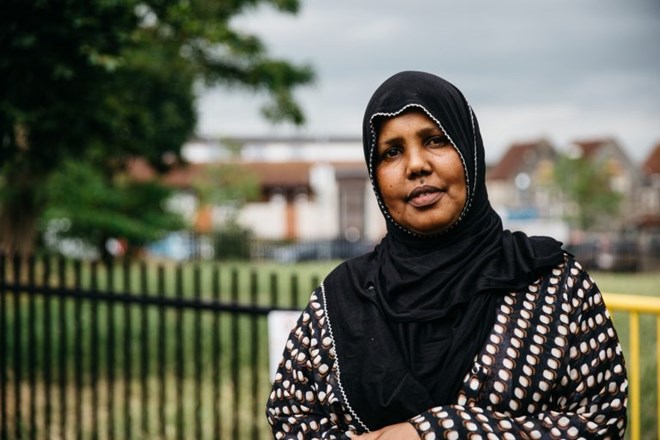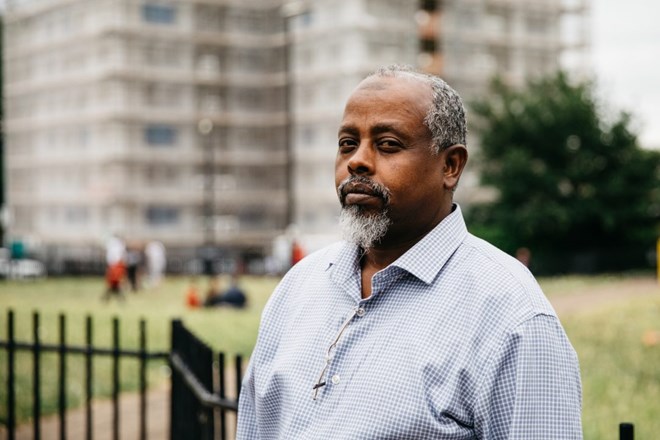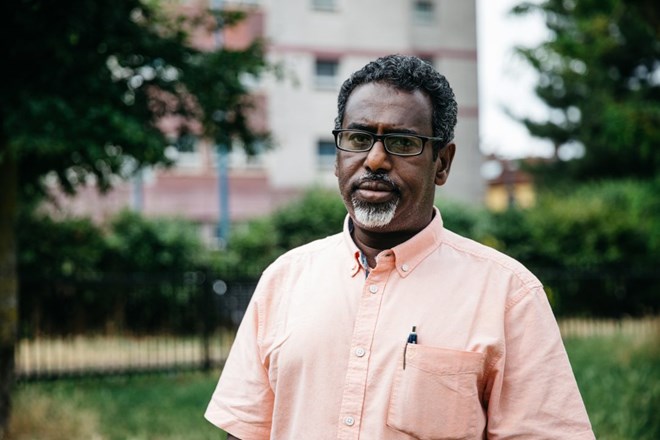The Bristol Cable
Matty Edwards
Thursday June 29, 2023
The council claims the plans to restrict through-traffic in parts of east Bristol were co-designed with local people, but some are angry about the consultation so far and feel the scheme is being imposed on them.
 Photos: @alexcarlturner
Photos: @alexcarlturner
“Closing these roads, firstly it’s not what [the council] said to people. And secondly it’s not going to achieve a reduction of traffic.”
Abdihakin Asir from Bristol Somali Community Association is telling me passionately about the current concerns in his community about the East Bristol Liveable Neighbourhood.
The scheme, which will be trialled later this year, will stop vehicles driving through a large area of Barton Hill, Redfield and St George. Residents and businesses will retain access but may have a less convenient route. The aims are to tackle air pollution, and encourage people to drive less.
We’ve met for a cup of tea on bustling Church Road because Abdihakin felt the Cable’s recent articles about the scheme didn’t include enough views from people living in Barton Hill, particularly the Somali community.
I’ve spent months writing about what is Bristol’s biggest intervention to date to restrict traffic in a residential neighbourhood, which seems to be dividing people. Many support the idea because they feel the area is too dominated by cars that squeeze down narrow roads, with the area being used as a quick cut-through.
But a significant number of locals have criticised the plans as making life much harder for those who can’t easily walk or cycle and can’t simply drive less.
As part of the reporting, we’ve spoken to a wide spectrum of people, but Abdihakin’s claim of not listening to enough Barton Hill residents has to be taken seriously. And as I discover, not only is the strength of feeling undeniable, but many think the council’s claim that the scheme has been co-designed with the local community after lots of consultation is bogus.
Abdihakin says the early consultation was about improvements to the area, and residents were raising issues like housing, local services and safer crossings by schools.

Abdihakin Asir from Bristol Somali Community Association (credit: Alexander Turner)
“Nobody asked the views of local people about closing roads,” he says. “This was a top-down thing that they claimed was consulting with the people.
“Whether the council listens or not, we will continue campaigning around this issue,” Abdihakin adds. “It’s a huge problem and will have a massive impact on so many families. Today you will see for yourself.”
And with that, we walk into Barton Hill along Ducie Road, where cars are driving past. Later this year, there will be a modal filter here to stop traffic.
Abdihakin says that people not from the area driving through is an issue, but that it’s wrong to crack down on that and punish residents.
“There are too many restrictions on the residents, who are [in] the poorest postcode in Bristol,” he says. “If people are having issues already, why do you have to double their problems?”
“Nobody is giving a clear explanation of the benefits of closing these roads,” he adds. “Anyone who wants to do that needs to come and see the people who live here, how they use these roads. Otherwise it’s just imposing.”
We arrive at a playground in Barton Hill where kids are playing in the afternoon sun. Multiple tower blocks loom over, including Eccleston House, where a fire last year rocked the local community.
Residents have gathered here today to have their say. A group of around 20 local residents, mostly Somali women, tell me in the strongest terms possible how they fear the road closures will impact their busy lives as they juggle childcare and working to make ends meet.
‘We depend on the roads’
Full of passion and frustration, many feel they haven’t been consulted enough and are having a major change imposed on them by an out-of-touch local council.
Cayni Sharif, 40, works as a care assistant. “When I’m working, we depend on the roads,” she tells me. “I drive from here, drop my kid at school, I go to my work, see maybe 15 clients a day. I need to do my shopping. Imagine how dependent I am on the roads.”
“The 36 bus only goes once an hour along Avonvale Road,” she says. Everyone agrees that the bus is totally unreliable.
“We are already in crisis,” she adds. “Imagine having to drive around and around and spend more on petrol. We have enough already to deal with.”
She shows me a list of all her clients in a day. “I go everywhere, imagine how it’s going to affect me. I have to pay my rent, my bills.”
Halima Weheliye is a mother of four, who works as a teaching assistant in St George and has a tight schedule to drop her children off at different schools and get to work on time.
“I can’t afford to send my kids to school on the bus – £16 a day,” she says.
“I asked them, what plan do you have? I’m going to lose my job. I’m one of many people who this will affect. I’d rather die from pollution.”
“Most of us are single parents, and we want to raise our children to do the best for them.”
Muna Mohamoud, 27, says: “Everybody that is here today is not happy and feels claustrophobic, they feel like this area is like a cage,” adding that not everyone can easily walk to the supermarket, or cycle, especially parents and people with mobility issues.
She is joined by her aunty who has a broken foot. “She feels the same as us all. She can’t walk to the GP.”
“All these parents feel stressed and don’t sleep at night because they’re thinking of their children and their homes and how they’re gonna go about their day,” she adds.
‘Nobody is listening to us’
The other thing that almost everyone mentions is not feeling listened to by the council’s consultation.
“Why are they targeting just our community?” says Muna. “They keep deciding things for us. When we try to come together and speak about it like this, we don’t have a voice. We don’t have someone higher than us to help us and there’s the language barrier as well.”
Muna, who is also translating for some of the women who are less confident speaking English, gives the example of poor communication from the council at the time of the fires in the tower blocks last year, when there wasn’t clear information in Somali.
These wounds are still fresh and multiple people mentioned worries about ambulances or fire engines being delayed, even if they are able to unlock modal filters manually. The feeling of not being listened to is also combined with not always feeling safe in cramped social housing and being stuck there with no chance of being rehoused.
“Apparently a consultation was supposed to be happening,” says Samira Muse, a community organiser and founder of Barton Hill Activity Club. “They gave leaflets talking about improving the area. People asked for zebra crossings, lollipop ladies, pharmacies, GPs, dentists, more parking for residents.”
“Bristol City Council hasn’t done any consultation. Whatever you published in your newspaper is fake. Four cyclists cannot talk for the whole community.”
Over the last 18 months, the council has put a lot of effort into consulting locals, including online surveys, an interactive map, holding in-person events and sending out leaflets and letters to thousands of households.
The problems that came up the most in the first phase of engagement were poor air quality, streets being too noisy with traffic, and the area feeling unsafe for walking and cycling. In the next phase, where residents were asked what kind of changes they wanted, the most popular ideas were safe crossings and junctions, better cycle lanes, more street trees and modal filters to block through traffic.
It’s true that the early framing of the consultation was about what improvements to the area people wanted to see, which has led to new street lighting, improved crossings, trees, cycle hangars and cycle lanes becoming part of the plans for the permanent scheme. This is perhaps why some residents expressed shock at the scale of the restrictions on vehicles being proposed.
“We just feel like we have no voice, that’s all. It’s sad to say,” says Muna. “Without trying to seem racist or anything, if this was any white area, they would be the first to say what they want and they’d be listened to. Why is it that us Somali people don’t have a say?”
This is a big blow to the council’s claim that the scheme has been designed with local people and not being imposed on the area. The trial will be introduced in the autumn, which is when it will become clear if the worries of these residents become a reality.
Councillor Don Alexander, the council’s cabinet member for transport, insists the local authority has engaged with local communities across the pilot area “extensively throughout all stages of the process.”
“We’ve had a big response to this project,” he said in a statement, “including people from the Somali community, who have given us their thoughts and feedback on our proposals for the trial.”
No long-term decisions have been made about the scheme, he added, and the trial would be an opportunity to test potential measures to see if they work for the local communities or if any changes are needed.
“Nobody’s ability to move around the neighbourhood is being restricted and access to homes and businesses will remain in place,” he said. “What the trial will do alongside our main aims is to release more space for active travel, tree planting and community space.”
He said the local authority is organising an extra drop-in session in Barton Hill to give more people the chance to share their views.

Yassin Mohamud, Green councillor for Lawrence Hill (credit: Alexander Turner)
Green councillor for Lawrence Hill, Yassin Mohamud, is helping organise more meetings for residents to speak to the council.
“Initially, I was supporting the project, but now we need to consider the feedback from residents,” he tells me. “It looks like it’s a very high priority now to listen to what the community is saying.”
He played a role in the initial consultation, where there were leaflets sent out and workshops delivered. “We thought that consultation was going through properly, but it looks like now the residents are saying they haven’t been consulted enough. That’s why we need more clarification.
“We need to listen to the residents and what they need. When we have the next meeting with [council] officers, we need to look at a map and look at exactly where it needs to change and what the community wants.
“Everything can change,” he adds. “When we sit down with officers and the community, we can find a solution.
“Something has got to be done,” says Muna. “We want meetings. We want to talk to the council and the media. We want our voices to be heard by them.”
This article is also being published in Somali. The translated text will be available shortly.